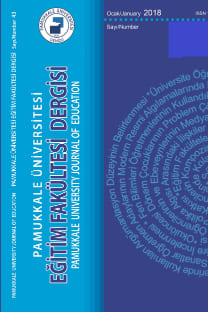FEN BİLGİSİ ÖĞRETMEN ADAYLARININ FEN DERSLERİNDE MATEMATİĞİN
Öğretmenlerin bir duruma karşı olumlu tutum geliştirmeleri sonucunda pozitif davranışların ortaya çıkmasında kendilerine olan inançları temel oluşturmaktadır. Bu nedenle öğretmen eğitiminde özyeterlik inançları önemli bir yer tutmaktadır. Bu çalışmada Fen Bilgisi öğretmen adaylarının fen derslerinde matematiğin kullanımına yönelik özyeterlik inançlarının öğretim programı ve cinsiyet gibi değişkenlere bağlı olarak değişip değişmediği incelenmiştir. Çalışmada veri toplama aracı olarak araştırmacılar tarafından geliştirilen âFende Matematiğin Kullanımına Yönelik Özyeterlik Ölçeğiâ (FMKÖ) kullanılmıştır. Araştırma betimsel bir çalışma olup, birinci ve dördüncü sınıfta öğrenime devam eden Fen Bilgisi öğretmen adaylarının (n=152) katılımıyla gerçekleştirilmiştir. Toplanan veriler t-testi ve varyans analizi yapılarak değerlendirilmiştir. Araştırma bulgularına göre; öğretmen adaylarının özyeterlik inançlarının cinsiyete bağlı olarak değişmediği, ancak sınıf düzeyine göre dördüncü sınıflar lehine anlamlı bir artış gösterdiği tespit edilmiştir.
Anahtar Kelimeler:
Özyeterlik İnancı, Fen Eğitimi, Öğretmen Eğitimi, Matematiğin Kullanımı
x
Teachersâ having positive attitudes towards a situation, result in positive behaviors and self-efficacy beliefs of teachersâ form the basis of this process. For that reason, self-efficacy believes are of crucial importance in teacher education. This study investigates whether science teachersâ self-efficacy beliefs toward the use of mathematics in science lessons have changed based on gender and class level. To collect the data, Self-efficacy Scale Toward the Use of Mathematics in Science Lessons (FMKO), which was developed by the researchers was administered. The study was qualitative in nature and the data collected from the first and fourth year science education teacher candidates (n=152). The data were then analyzed by using t-tests and variance analyses. Results showed no statistical difference on the scores of males and females but showed a significant increase with respect to the class level.
___
- Balcı, A. (2001). Sosyal bilimlerde araştırma: Yöntem, teknik ve ilkeler. Pegem Yayıncılık, Ankara.
- Bandura, A. (1997). Self-Efficacy. The exercise of control. W. H. Freeman and Company. New York.
- Brody, C., M. and Davidson, N. (1998). Professional development for cooperative learning:Issues and approaches. Albany, NY: State University of New York Press.
- Cantürk Günhan, B. ve Pirgayipoğlu, D. (2004). Eğitim fakültelerinde ilköğretim matematik bölümü öğrencilerin matematiğe yönelik özyeterlik algılarındaki farklılıklar. VI. Ulusal Fen Bilimleri ve Matematik Eğitimi Sempozyumu M.Ü. Atatürk Eğitim Fakültesi, 09-10 Eylül 2004. İstanbul
- Enochs, L. G., Smith P. L. and Huinker, D. (2000). Establishing factorial validity of the mathematics teaching efficacy beliefs instrument. School Science and Mathematics. 100, 194-202.
- Erdal, S. O. Ongel, K. (2003). Promoting learner-centered instruction through the use of cooperative and ınquiry learning strategies. ERIC Number ED479308, Columbus, OH: ERIC Clearinghouse on Mathematics, Science and Environmental Education.
- Friend, H. (1985). The effect of science and mathematics integration on selected seventh grade students attitudes toward and achievement in science. School Science and Mathematics, 85, 453-461.
- Huntley M. A. (1998). Design and implementation of a framework for defining integrated mathematics and science education. School Science and Mathematics. 98, 320-327.
- Koballa, T. R. Jr. and Bethel, L. J. (1984). Integration of science and other school subjects. In D. Holdzkom and P. B. Lutz (Eds.) Research within reach. Science education. (pp. 79-107). Washington D.C. National Science Teacher Association.
- Moran, T. & Hoy A. W. (2001). Teacher efficacy: Capturing elusive construct. Teaching and Teacher Education, 17, 783-805.
- Morell, P. & Caroll, J. (2003). An extended examination of preservice elemantary teachers’ science teaching self-efficacy. School Science and Mathematics, 103, 246-251.
- National Research Council. (NRC). (1996). National Science Education Standards. Washington, DC: National Academy Press.
- Pajares, F. (1996). Self-Efficacy beliefs in academic settings. Review of Educational Research, 66(4), 543-578.
- Roebuck, K.I. & Warden M. A. (1998). Searching for the center on the mathematics- science continuum. School Science and Mathematics, 98, 328-333.
- Savran, A. & Çakıroğlu, J. (2001). Preservice biology teachers’ perceived efficacy beliefs in teaching biology. Hacettepe Üniversitesi Eğitim Fakültesi Dergisi, 21, 105-112.
- Siegle D. (2003). Influencing student mathematics self-efficacy through teacher training. Paper Presented At The Annual Meeting Of The American Research Association, Chicago, IL.
- Tschannen-Moran, M. ve Hoy, A., W. (2001). Teacher efficacy: capturing an elusive construct. Teaching and Teacher Education, 17, 783–805.
- Tosun, T. (2000). The beliefs of preservice elemantary teachers toward science and science education. School Science and Mathematics, 100, 374-379.
- Umay, A. (2002). İlköğretim matematik öğretmenliği programının matematiğe karşı özyeterlik algısına etkisi. V. Ulusal Fen Bilimleri ve Matematik Eğitimi Sempozyumu ODTÜ, 16-18 Eylül 2002. Ankara.
- Zengin, U. (2003). İlköğretim Öğretmenlerinin Özyeterlik Algıları ve Sınıf İçi İletişim Örüntüleri. D.E.Ü. Eğitim Bilimleri Enstitüsü Yayımlanmamış Yüksek Lisans Tezi, İzmir.
- ISSN: 1301-0085
- Yayın Aralığı: Yılda 3 Sayı
- Başlangıç: 1996
- Yayıncı: -
Sayıdaki Diğer Makaleler
İLKÖĞRETİM FEN LABORATUARI İÇİN TUTUM
Mustafa YEŞİLYURT, Turgut KURT, Atilla TEMUR
ÜNİVERSİTENİN VAR OLUŞ NEDENİ (ÜNİVERSİTENİN MİSYONU) *
LİSE-1 ÖĞRENCİLERİNİN FARKLI İKİ ÖĞRETİM YÖNTEMİNE GÖRE FİZİK BAŞARI
Selahattin GÖNEN, Serhat KOCAKAYA
Habibe TEZCAN, Üzeyir YILMAZ, Mine BABAOĞLU
İLKÖĞRETİM OKULU ÖĞRENCİLERİNİN OKUL YAŞAMININ NİTELİĞİNE İLİŞKİN
THE INTERNET COMPETENCY LEVELS OF TURKISH HIGH SCHOOL STUDENTS AND
İSTANBUL KONFERANSI (1876)âNA GİDEN YOLDA İNGİLTEREâNİN âDOĞUâ
FEN BİLGİSİ ÖĞRETMEN ADAYLARININ FEN DERSLERİNDE MATEMATİĞİN
Bilge Taşkin CAN, Berna Cantürk GÜNHAN, Sevinç Öngel ERDAL
FEN BİLGİSİ ÖĞRETMEN ADAYLARININ SORU SORMA BECERİLERİNİN BLOOM
